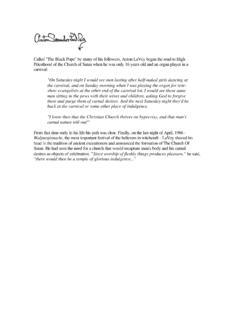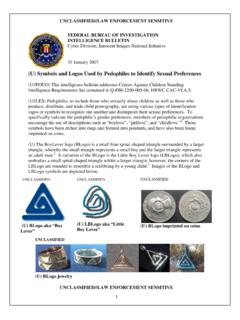Transcription of PROPAGANDA - WHALE
1 PROPAGANDA . By EDWARD L. BERNAYS. 1928. CONTENTS. I. ORGANIZING CHAOS .. 9. II. THE NEW PROPAGANDA .. 19. III. THE NEW PROPAGANDISTS .. 32. IV. THE PSYCHOLOGY OF PUBLIC RELATIONS 47. V. BUSINESS AND THE PUBLIC .. 62. VI. PROPAGANDA AND POLITICAL LEADERSHIP 92. VII. WOMEN'S ACTIVITIES AND PROPAGANDA 115. VIII. PROPAGANDA FOR EDUCATION .. 121. IX. PROPAGANDA IN SOCIAL SERVICE .. 135. X. ART AND SCIENCE .. 141. XI. THE MECHANICS OF PROPAGANDA .. 150. CHAPTER I. ORGANIZING CHAOS. THE conscious and intelligent manipulation of the organized habits and opinions of the masses is an important element in democratic society. Those who manipulate this unseen mechanism of society consti- tute an invisible government which is the true ruling power of our country. We are governed, our minds are molded, our tastes formed, our ideas suggested, largely by men we have never heard of.
2 This is a logical result of the way in which our democratic society is organized. Vast numbers of human beings must cooperate in this manner if they are to live together as a smooth- ly functioning society. Our invisible governors are, in many cases, un- aware of the identity of their fellow members in the inner cabinet. They govern us by their qualities of natural leader- ship, their ability to supply needed ideas and by their key position in the social structure. Whatever atti- tude one chooses to take toward this condition, it remains a fact that in almost every act of our daily lives, whether in the sphere of politics or business, in our social conduct or our ethical thinking, we are 9. PROPAGANDA dominated by the relatively small number of per- sons a trifling fraction of our hundred and twenty million who understand the mental processes and social patterns of the masses.
3 It is they who pull the wires which control the public mind, who harness old social forces and contrive new ways to bind and guide the world. It is not usually realized how necessary these in- visible governors are to the orderly functioning of our group life. In theory, every citizen may vote for whom he pleases. Our Constitution does not envisage political parties as part of the mechanism of government, and its framers seem not to have pictured to themselves the existence in our national politics of anything like the modern political ma- chine. But the American voters soon found that without organization and direction their individual votes, cast, perhaps, for dozens or hundreds of can- didates, would produce nothing but confusion. In- visible government, in the shape of rudimentary political parties, arose almost overnight.
4 Ever since then we have agreed, for the sake of simplicity and practicality, that party machines should narrow down the field of choice to two candidates, or at most three or four. In theory, every citizen makes up his mind on public questions and matters of private conduct. In practice, if all men had to study for themselves the abstruse economic, political, and ethical data involved 10. Organizing Chaos in every question, they would find it impossible to come to a conclusion about anything. We have voluntarily agreed to let an invisible government sift the data and high-spot the outstanding issues so that our field of choice shall be narrowed to practical proportions. From our leaders and the media they use to reach the public, we accept the evidence and the demarcation of issues bearing upon public ques- tions; from some ethical teacher, be it a minister, a favorite essayist, or merely prevailing opinion, we accept a standardized code of social conduct to which we conform most of the time.
5 In theory, everybody buys the best and cheapest commodities offered him on the market. In practice, if every one went around pricing, and chemically testing before purchasing, the dozens of soaps or fabrics or brands of bread which are for sale, eco- nomic life would become hopelessly jammed. To avoid such confusion, society consents to have its choice narrowed to ideas and objects brought to its attention through PROPAGANDA of all kinds. There is consequently a vast and continuous effort going on to capture our minds in the interest of some policy or commodity or idea. It might be better to have, instead of PROPAGANDA and special pleading, committees of wise men who would choose our rulers, dictate our conduct, private and public, and decide upon the best types of clothes for us to wear and the best kinds of food for us to 11.
6 PROPAGANDA eat. But we have chosen the opposite method, that of open competition. We must find a way to make free competition function with reasonable smooth- ness. To achieve this society has consented to permit free competition to be organized by leadership and PROPAGANDA . Some of the phenomena of this process are crit- icized the manipulation of news, the inflation of personality, and the general ballyhoo by which poli- ticians and commercial products and social ideas are brought to the consciousness of the masses. The in- struments by which public opinion is organized and focused may be misused. But such organization and focusing are necessary to orderly life. As civilization has become more complex, and as the need for invisible government has been increas- ingly demonstrated, the technical means have been invented and developed by which opinion may be regimented.
7 With the printing press and the newspaper, the railroad, the telephone, telegraph, radio and air- planes, ideas can be spread rapidly and even instanta- neously over the whole of America. H. G. Wells senses the vast potentialities of these inventions when he writes in the New York Times: "Modern means of communication the power afforded by print, telephone, wireless and so forth, of rapidly putting through directive strategic or tech- nical conceptions to a great number of cooperating 12. Organizing Chaos centers, of getting quick replies and effective discus- sion have opened up a new world of political proc- esses. Ideas and phrases can now be given an effectiveness greater than the effectiveness of any personality and stronger than any sectional interest. The common design can be documented and sustained against perversion and betrayal.
8 It can be elaborated and developed steadily and widely without personal, local and sectional misunderstanding.". What Mr. Wells says of political processes is equally true of commercial and social processes and all manifestations of mass activity. The groupings and affiliations of society to-day are no longer subject to "local and sectional" limitations. When the Con- stitution was adopted, the unit of organization was the village community, which produced the greater part of its own necessary commodities and generated its group ideas and opinions by personal contact and discussion directly among its citizens . But to-day, because ideas can be instantaneously transmitted to any distance and to any number of people, this geo- graphical integration has been supplemented by many other kinds of grouping, so that persons having the same ideas and interests may be associated and regi- mented for common action even though they live thousands of miles apart.
9 It is extremely difficult to realize how many and diverse are these cleavages in our society. They may be social, political, economic, racial, religious or eth- 13. PROPAGANDA ical, with hundreds of subdivisions of each. In the World almanac , for example, the following groups are listed under the A's: The League to Abolish Capital Punishment; As- sociation to Abolish War; American Institute of Accountants; Actors' Equity Association; Actuarial Association of America; International Advertising Association; National Aeronautic Association; Al- bany Institute of History and Art; Amen Corner;. American Academy in Rome; American Antiquarian Society; League for American Citizenship; Ameri- can Federation of Labor; Amorc (Rosicrucian Or- der); Andiron Club; American-Irish Historical Association; Anti-Cigarette League; Anti-Profanity League; Archeological Association of America; Na- tional Archery Association; Arion Singing Society.
10 American Astronomical Association; Ayrshire Breed- ers' Association; Aztec Club of 1847. There are many more under the "A" section of this very limited list. The American Newspaper Annual and Directory for 1928 lists 22,128 periodical publications in America. I have selected at random the N's pub- lished in Chicago. They are: Narod (Bohemian daily newspaper); Narod-Pol- ski (Polish monthly); (pharmaceutical);. National Corporation Reporter; National Culinary Progress (for hotel chefs); National Dog Journal;. National Drug Clerk; National Engineer; National 14. Organizing Chaos Grocer; National Hotel Reporter; National Income Tax Magazine; National Jeweler; National Journal of Chiropractic; National Live Stock Producer;. National Miller; National Nut News; National Poultry, Butter and Egg Bulletin; National Provi- sioner (for meat packers); National Real Estate Journal; National Retail Clothier; National Retail Lumber Dealer; National Safety News; National Spiritualist; National Underwriter; The Nation's Health; Naujienos (Lithuanian daily newspaper).


![t])emons in tlie Cnurcn - WHALE](/cache/preview/1/f/d/7/8/4/6/7/thumb-1fd78467ea0618b4551b1b6caae9143d.jpg)




